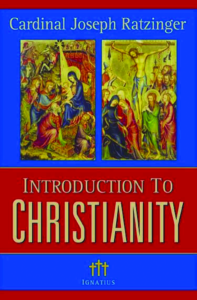Ratzinger’s 1968 book Introduction to Christianity
 Translated into twenty languages, Introduction to Christianity originated as lectures delivered by Fr. Joseph Ratzinger at the University of Tübingen in 1967. A few features of Introduction to Christianity are worth highlighting since they remain relevant even today. First, the clearsightedness with which Ratzinger saw, within a few years of the Council’s close, the widespread betrayal of the Council’s foundational principles and governing affirmations. In the “Preface,” dated summer 1968, he contends: “The question of the real content and meaning of the Christian faith is enveloped today in a greater fog of uncertainty than at almost any earlier period in history.” And he draws upon the folk story of “Clever Hans”—who trades his lump of gold for ever less valuable objects until he is left with a whetstone—to indict those theologians who have “gradually watered down the demands of faith.” A few years later he would sum up the betrayal by lamenting that “they changed wine into water and called it ‘aggiornamento.’”
Translated into twenty languages, Introduction to Christianity originated as lectures delivered by Fr. Joseph Ratzinger at the University of Tübingen in 1967. A few features of Introduction to Christianity are worth highlighting since they remain relevant even today. First, the clearsightedness with which Ratzinger saw, within a few years of the Council’s close, the widespread betrayal of the Council’s foundational principles and governing affirmations. In the “Preface,” dated summer 1968, he contends: “The question of the real content and meaning of the Christian faith is enveloped today in a greater fog of uncertainty than at almost any earlier period in history.” And he draws upon the folk story of “Clever Hans”—who trades his lump of gold for ever less valuable objects until he is left with a whetstone—to indict those theologians who have “gradually watered down the demands of faith.” A few years later he would sum up the betrayal by lamenting that “they changed wine into water and called it ‘aggiornamento.’”
Second, the book is structured as a theological-spiritual meditation upon the Apostles’ Creed. The choice is significant, for its origin is the baptismal exchange wherein the neophyte commits to a transformed existence, renouncing those powers that diminish the human and confessing the life-giving belief in Father, Son, and Holy Spirit. Indeed, Ratzinger boldly sets forth his book’s aim: “to help understand faith afresh as something that makes possible true humanity in the world of today.”
Third, the heart of the matter (and of the book) is its Christological vision. Once again, Ratzinger’s approach is fully theological and intensely personal. “Christian faith is more than the option in favor of a spiritual ground to the world,” he writes. “Its central formula is not ‘I believe in something,’ but ‘I believe in you.’ It is the encounter with the man Jesus, and in this encounter, it experiences the meaning of the world as a person.” It is Jesus who grounds and enables transformed human existence: what the tradition calls theosis or divinization.
As always with Ratzinger, his reflection weds fidelity and creativity. […] In Introduction to Christianity, Ratzinger sketched an approach to Christology that was faithful to the Church’s millennial tradition, yet painted in fresh interpersonal language. Jesus Christ is the new Adam, the eschatos Adam, who is defined by total relationality: the Son whose existence is from the Father, for the sake of men and women of every age. Jesus Christ does not merely institute the Eucharist. His total being is Eucharist: gratitude to the Father, self-gift for the many. And he continually consecrates his Church, by his loving sacrifice, as a eucharistic people.
(From “What Benedict Saw,” by Robert P. Imbelli, FirstThings.com)
–Robert P. Imbelli, a priest for 58 years, is a former professor at Dunwoodie Seminary in New York and graduate theology professor at Boston University.
An Excerpt from Joseph Ratzinger’s Introduction to Christianity
Perhaps in the last analysis it is impossible to escape a paradox whose logic is completely disclosed only to the experience of a life based on faith. Anyone who entrusts himself to a life of faith becomes aware that both exist: the radical character of grace that frees helpless man and, no less, the abiding seriousness of the responsibility that summons man day after day. Both together mean that the Christian enjoys, on the one hand, the liberating, detached tranquility of him who lives on that excess of divine justice known as Jesus Christ. … He sees through all our errors and remains well disposed to us. …
At the same time, the Christian knows, however, that he is not free to do whatever he pleases, that his activity is not a game that God allows him and does not take seriously. He knows that he must answer for his actions, that he owes an account as a steward of what has been entrusted to him… It shows our life to be a serious business and precisely by doing so gives it its dignity.
–Joseph Ratzinger, Introduction to Christianity, 1968; English edition: Ignatius Press, 2000, 2004






Facebook Comments